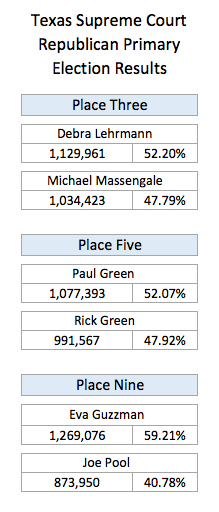© 2015 The Texas Lawbook.
By Mark Curriden
(March 3) – The three sitting Texas Supreme Court justices – Paul Green, Eva Guzman and Debra Lehrmann – won their Republican primary races Tuesday. Two of the races were close – closer than many court watchers predicted.
Justice Paul Green faced the stiffest competition from Rick Green, but the justice prevailed with 52 percent of the vote.
“It was a four-point win, but it was still a win,” Justice Green said in an interview with The Texas Lawbook.
Justice Guzman received the most votes (1,269,076) of those running for the state’s highest court, as she defeated Joe Pool 59.2 percent to 40.8 percent.
Michael Massengale, a judge on the 1st Court of Appeals in Houston, came closer to upsetting Justice Lehrmann than many court watchers predicted. Justice Lehrmann obtained 52.2 percent of the votes cast, while Massengale obtained 47.8 percent.
Justice Green said that running for a judicial position is unlike any other elected office because the candidates cannot state their positions on specific issues because it would require them to recuse themselves when cases involving those issues come before the court.
The justice said there are administration of justice issues that are important for the candidates to discuss.
“There is this perception out there of basic unfairness on who gets justice,” he said. “People see the wealthy being able to hire expensive lawyers and having more success in the courts than people who cannot afford counsel. It’s a real issue because it involves confidence in our justice system.”
Justice Guzman said a significant challenge today for judicial candidates is the ability to “communicate with voters effectively when there are so many judicial races on the ballot.”
“In the simplest terms, voters want judges who have the know-how and courage to do the right thing,” she said. “For most, that means choosing judges who are committed to the rule of law, who apply the law equally and fairly to all alike, and who treat all who come before the court with dignity, courtesy and respect.”
Justice Guzman agrees that campaigning can be taxing.
“There is a steady stream of candidate forums, speaking requests, and other events and appearances and, of course, fundraising,” she said. “Allocating time and resources effectively is the key to managing the demands of a statewide judicial campaign.
“I’m high-energy and I enjoy traveling around the state and interacting with voters,” Justice Guzman said. “For me, it’s the best part of the process. But, there’s no denying the process is exhausting, especially for an incumbent who is still managing a full load of cases. A candidate’s family makes a lot of sacrifices, too. I could not possibly manage it all without my family’s strong support.”
Justice Lehrmann, who says she and her husband have put about 260,000 miles on their car, confirms the difficulty of running for a statewide judicial office.
“Texas is just so big that it is difficult to get the message out to everyone,” she said. “We try to reach out to people personally, but it is unrealistic to think that you can personally touch everyone. It is physically demanding.”
Justice Lehrmann didn’t get much of an opportunity to celebrate her election victory, as she had to travel immediately after the election to a meeting of the American Law Institute, which is one of the most highly respected legal organizations in the U.S.
The ALI is considered the premier thought leader on legal issues and trends. Justice Lehrmann is one of ALI’s leading expert advisors on the Restatement on Children and the Law.
“I am a committed conservative who applies the law in a deliberative, methodical and scholarly manner,” she said. “The public wants judges who are accountable, and who apply these principles in a fair and consistent manner across the board.”
For full details and vote count results on the judicial elections, click here: enrpages.sos.state.tx.us.

© 2015 The Texas Lawbook. Content of The Texas Lawbook is controlled and protected by specific licensing agreements with our subscribers and under federal copyright laws. Any distribution of this content without the consent of The Texas Lawbook is prohibited.
If you see any inaccuracy in any article in The Texas Lawbook, please contact us. Our goal is content that is 100% true and accurate. Thank you.
